“Everyone has their own story, but it hurts us all the same”. Learning from the experiences of older Ukrainian refugees in Poland
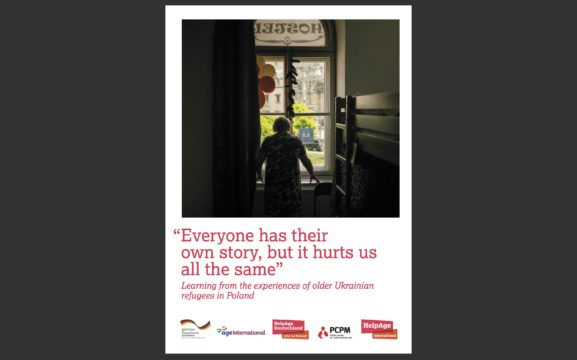
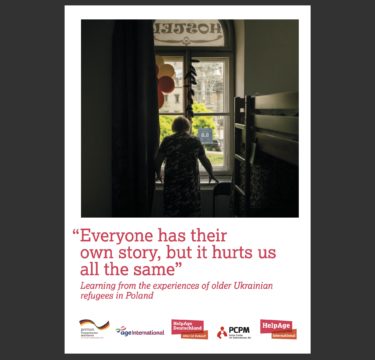
Nearly one million Ukrainian refugees continue to live in Poland. 7% of them are older people over 60 years of age – read full report.
Russia’s full-scale invasion of Ukraine in February 2022 forced millions of Ukrainians to seek refuge abroad, many fleeing into member states of the European Union, particularly those which border Ukraine. Poland saw one of the largest influxes of refugees, and 16 months into the crisis, nearly one million Ukrainian refugees continue to live in the country. Seven per cent of them, nearly 73,000, are older people over 60 years of age. The entry of such a high number of refugees – and such a high proportion of older refugees – into EU member states is unprecedented.
With the majority of studies on the conflict focusing on Ukrainian refugees as a whole, and since much of the existing knowledge focuses on younger population groups, this report provides a closer investigation into the needs, challenges and wellbeing of older Ukrainians in Poland. It puts the voices of older Ukrainian refugees at the centre – gathered through quantitative survey, interviews and focus group discussions – and complements them with interviews with key stakeholders involved in planning, regulating and providing services to Ukrainian refugees.
The findings show that older Ukrainian refugees in Poland face financial insecurity, uncertainty about the future and a number of barriers in accessing required assistance, services and information. This report puts forward recommendations on how to improve the wellbeing of older Ukrainian refugees in Poland and lessons to be learnt for the future.
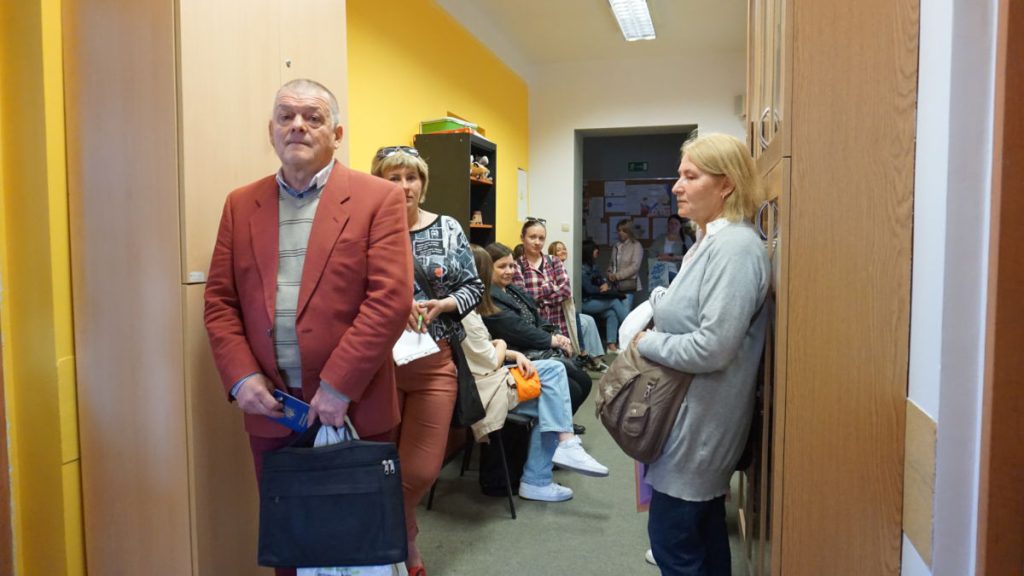
Eighty-five per cent of refugees we spoke to for this report are not employed in Poland, only 10 per cent have a full or part-time job and 5 per cent have irregular or seasonal work. The findings show older refugees face barriers in finding work in Poland, including the risk of falling into informal employment. Given how low the average Ukrainian pension is, most older refugees are dependent on financial support from the Polish state, family members, and, to a much lesser degree, financial assistance from NGOs and Polish hosts.
Households headed by older people have more limited sources of income than households with at least one person of a working age. The findings show the need to develop a longer-term strategy that will give older refugees financial security to meet their basic needs.
Study findings confirm that older Ukrainian refugees have good access to the one-off cash assistance provided to all Ukrainian refugees by the Polish government and universal state family benefits, such as child support. However, access to social protection mechanisms for people who cannot work due to age, disability, or difficult financial situations, was found to be more troublesome.
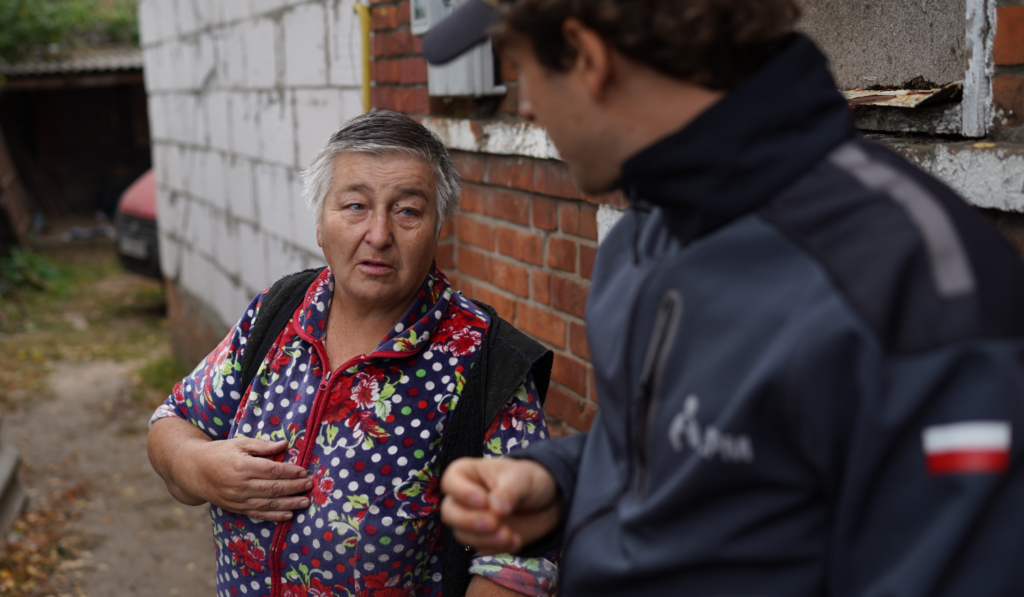
Accommodation remains one of the most significant long-term challenges for older Ukrainian refugees in Poland. At the time of the survey, nearly half of respondents rented their accommodation and half benefitted from some kind of accommodation support.
Households headed by older people were found to be more dependent on the accommodation support than households with at least one person of working age.
The findings show a strong need for the continuation of accommodation support schemes, such as access to collective shelters free of charge or rental subsidies for Polish hosts for the most at-risk older refugees who cannot afford the cost of rent. The withdrawal of such support could put older refugees at risk of feeling compelled to return to Ukraine, living in suboptimal conditions or even homelessness.
Many older Ukrainian refugees require medical attention and facilitated access to the Polish healthcare system. Sixty-one per cent have a disability as measured by the Washington Group Short Set on Functioning (WG-SS), 70 per cent have a chronic illness or serious medical condition and 64 per cent undergo treatment or take medication. Long waiting times for specialist care, language barriers and lack of information were identified as the main challenges in accessing healthcare in Poland. The majority of older Ukrainian refugees interviewed for this study struggle to cover their health-related expenses, with only 8 per cent being able to pay their medical bills in full. The three main health-related costs that they struggle to meet are medicine, specialised treatment and doctor appointments. The study highlighted the need to support older Ukrainian refugees in meeting their health-related costs.
The mental health and psychosocial wellbeing of older Ukrainian refugees emerge as a key concern.
Nearly 80 per cent of surveyed refugees felt worried, anxious and/or depressed every day or most days in the 30 days prior to the survey. The findings show a strong need to improve older refugees’ access to mental health and psychosocial support in Poland, as well as other means of assistance within the communities in which they live that strengthen links and social connections, for example through support groups for and with older Ukrainians.
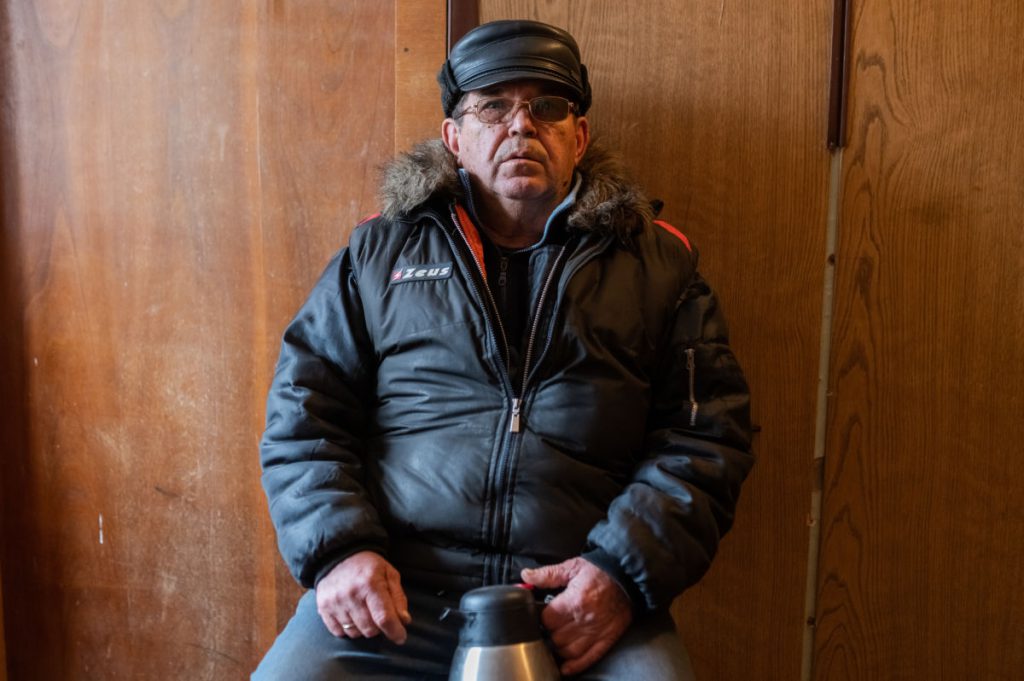
Lack of information and language barriers are significant challenges in ensuring that older Ukrainian refugees can access services and social inclusion activities. The study identified the need for Polish language courses tailored to the needs of older Ukrainian refugees that can also serve as a means for increasing their social participation.
The main channels used by survey respondents to access information are social networks and the Internet, with age group and household composition emerging as important factors in digital literacy.
The findings illustrate the need to both diversify information channels to reach older refugees, and to develop a digital platform gathering information relevant to this age group. Another important way to bridge the information gap and facilitate access to services and public institutions is the provision of older people’s assistants.
Eighteen per cent of survey respondents did not get out of the house to attend social meetings, activities or visit friends in the 30 days prior to the interview, with people over 70 being less likely to attend social events than those in their sixties. Difficult to access (e.g. no transport), lack of interest in attending and no one to go with were cited as the three main reasons preventing older people from participating in social events.
The study showed a shortage of initiatives that aim to integrate older Ukrainians with Polish counterparts and, overall, older Ukrainians are rarely (if at all) included in programmes or activities directed at older Polish people.
The study found an acute shortage of programmes and activities targeting older Ukrainian refugees and tailored to the needs and challenges faced by this age group.
The main reasons for the lack of such initiatives, as cited by the interviewed representatives of public institutions and NGOs, were the initial emergency stage of the crisis when the focus was on providing basic needs for all; the relatively lower number of older Ukrainians compared to other age groups; and donor requirements for specific programmes.
Now that the emergency phase has ended, it is time to look into the specific needs of refugees, including older people. To be successful, these efforts need to be grounded in longer-term migration and social policies; accurate data on the refugee population in respective localities; intersectoral coordination; and above all, the voices and needs of older refugees themselves.
It is crucial to consult with older people when designing programmes that are inclusive of their needs and go beyond the one-size-fits-all approach. We must understand the contextual factors that can act as a barrier to older people’s voices and create a safe space which allows for meaningful participation of older people in decision-making processes around issues including policies, programmes and services.